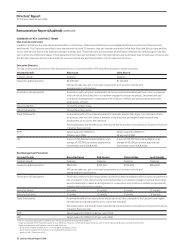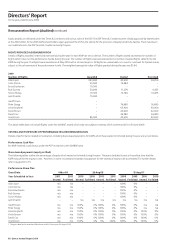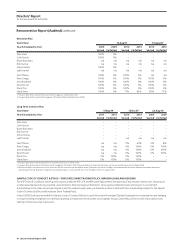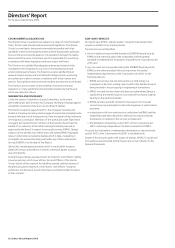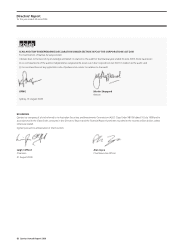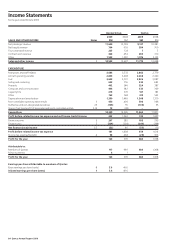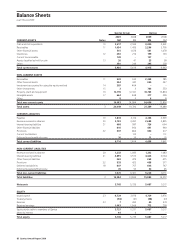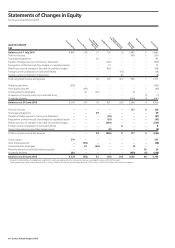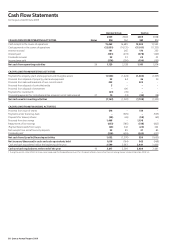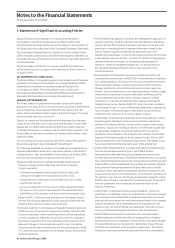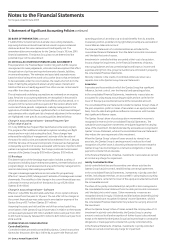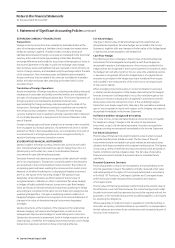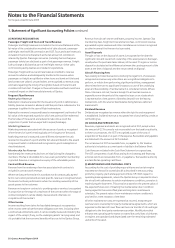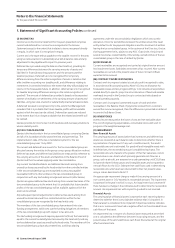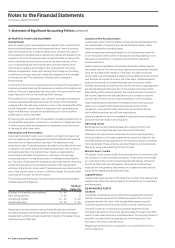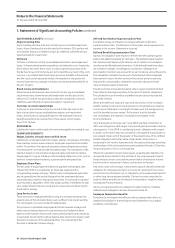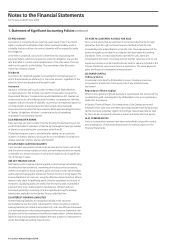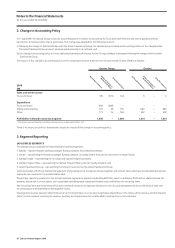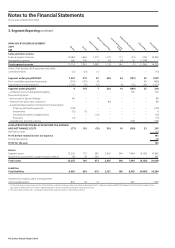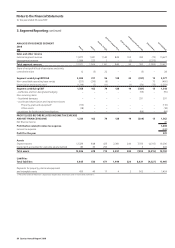Qantas 2009 Annual Report Download - page 91
Download and view the complete annual report
Please find page 91 of the 2009 Qantas annual report below. You can navigate through the pages in the report by either clicking on the pages listed below, or by using the keyword search tool below to find specific information within the annual report.
89 Qantas Annual Report 2009
Notes to the Financial Statements
for the year ended 30 June 2009
1. Statement of Significant Accounting Policies
Qantas Airways Limited (Qantas) is a company limited by shares,
incorporated in Australia whose shares are publicly traded on the
Australian Stock Exchange (ASX) and which is subject to the operation of
the Qantas Sale Act as described in the Corporate Governance Statement.
The consolidated Financial Report of Qantas for the year ended 30 June
2009 comprises Qantas and its controlled entities (together referred to as
the Qantas Group) and the Qantas Group’s interest in associates and jointly
controlled entities.
The Financial Report of Qantas for the year ended 30 June 2009 was
authorised for issue in accordance with a resolution of the Directors on
31 August 2009.
(A) STATEMENT OF COMPLIANCE
The Financial Report is a general purpose financial report which has been
prepared in accordance with Australian Accounting Standards (AASBs)
adopted by the Australian Accounting Standards Board and the
Corporations Act 2001. The Financial Report also complies with
International Financial Reporting Standards (IFRSs) and interpretations
adopted by the International Accounting Standards Board.
(B) BASIS OF PREPARATION
The Financial Report is presented in Australian dollars and has been
prepared on the basis of historical costs except in accordance with relevant
accounting policies where assets and liabilities are stated at their fair
values. Assets classified as held for sale are stated at the lower of carrying
amount and fair value less costs to sell.
Qantas is a company of the kind referred to in Australian Securities and
Investments Commission (ASIC) Class Order 98/100 dated 10 July 1998
(updated by CO 05/641 effective 28 July 2005 and CO 06/51 effective
31 January 2006) and in accordance with the Class Order, amounts in the
Financial Report have been rounded to the nearest million dollars, unless
otherwise stated.
The accounting policies set out below have been consistently applied to
all periods presented in the consolidated Financial Report.
The following standards, amendments to standards and interpretations
have been identified as those which may impact Qantas in the period of
initial application. They are available for early adoption at 30 June 2009,
but have not been applied in preparing this financial report.
•RevisedAASB3BusinessCombinations(2008)incorporatesthe
following changes that are likely to be relevant to the Qantas
Group’s operations:
– contingent consideration will be measured at fair value, with
subsequent changes therein recognised in profit or loss;
– transaction costs, other than share and debt issue costs, will be
expensed as incurred;
– any pre-existing interest in the acquiree will be measured at either
fair value, or at its proportionate interest in the identifiable assets
and liabilities of the acquiree, on a transaction-by-transaction basis.
Revised AASB 3, which becomes mandatory for the Qantas Group’s
30 June 2010 financial statements, will be applied prospectively and
therefore there will be no impact on prior periods.
•AmendedAASB127ConsolidatedandSeparateFinancialStatements
(2008) requires accounting for changes in ownership interests by the
Group in a subsidiary, while maintaining control, to be recognised as
an equity transaction. When the Group loses control of a subsidiary,
any interest retained in the former subsidiary will be measured at fair
value with the gain or loss recognised in profit or loss. The Qantas
Group has not yet determined the effect of the amendments to AASB
127, which becomes mandatory for the Qantas Group’s 30 June 2010
financial statements.
•AASB8OperatingSegmentsintroducesthe‘managementapproach’to
segment reporting. AASB 8, which becomes mandatory for the Qantas
Group’s 30 June 2010 financial statements, will require a change in the
presentation on and disclosure of segment information based on the
internal reports regularly reviewed by the Qantas Group’s Chief
Operating Decision Maker in order to assess each segment’s performance
and to allocate resources to them. Currently, the Qantas Group presents
segment information in respect of its business and geographical
segments. Under the management approach, it is anticipated that
the segments disclosed will match the business segments in the
current disclosures.
•RevisedAASB101PresentationofFinancialStatements(2007)and
consequential amendments in AASB 2009-6 Amendments to Australian
Accounting Standards, introduces the term total comprehensive income,
which represents changes in equity during a period other than those
changes resulting from transactions with owners in their capacity as
owners. Total comprehensive income may be presented in either a single
statement of comprehensive income (effectively combining both the
income statement and all non-owner changes in equity in a single
statement) or, in an income statement and a separate statement of
comprehensive income. Revised A ASB 101, which becomes mandatory
for the Qantas Group’s 30 June 2010 financial statements, is expected to
have an impact on the presentation of the Qantas Group’s financial
statements with respect to non-owner changes in equity.
•AASB2008-1AmendmentstoAustralianAccountingStandard–Share-
based Payments: Vesting Conditions and Cancellations clarifies the
definition of vesting conditions, introduces the concept of non-vesting
conditions, requires non-vesting conditions to be reflected in grant-date
fair value and provides the accounting treatment for non-vesting
conditions and cancellations. The amendments to AASB 2 Share-based
Payment will become mandatory for the Qantas Group’s 30 June 2010
financial statements, with retrospective applications. The Qantas Group
has not yet determined the potential impact of the amendment.
•AASB2008-5AmendmentstoAustralianAccountingStandardsarising
from the Annual Improvements Project and 2008-6 Further
Amendments to Australian Accounting Standards arising from the
Annual Improvements Project, AASB 2009-4 Amendments to Australian
Accounting Standards arising from the Annual Improvements Project and
AASB 2009-5 Further Amendments to Australian Accounting Standards
arising from the Annual Improvements Project affect various AASBs
resulting in minor changes for presentation, disclosure, recognition and
measurement purposes. The amendments, which become mandatory for
the Qantas Group’s 30 June 2010 financial statements, except for AASB
2009-5 which becomes mandatory for the Qantas Group’s 30 June 2011
financial statements, are not expected to have any impact on the
financial statements.
•AASB2008-7AmendmentstoAccountingStandards–Costofan
Investment in a Subsidiary, Jointly Controlled Entity or Associate changes
the recognition and measurement of dividends received as income and
addresses the accounting of a newly formed parent entity in the separate
financial statements. The amendments become mandatory for the
Qantas Group’s 30 June 2010 financial statements. The Qantas Group
has not yet determined the potential effect of the amendments.
•AASB2008-8AmendmentstoAustralianAccountingStandards–
Eligible Hedge Items clarifies the effect of using options as hedging
instruments and the circumstances in which inflation risk can be hedged.
The amendments become mandatory for the Qantas Group’s 30 June
2010 financial statements, with retrospective application. The Qantas
Group has not yet determined the potential effect of the amendments.


